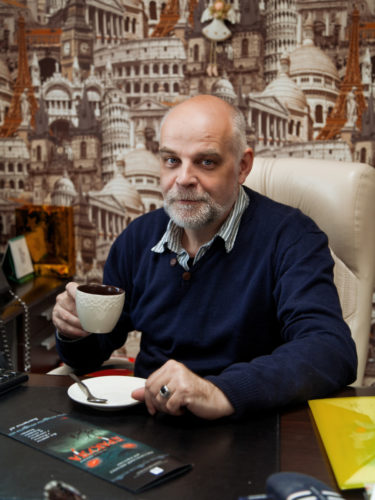


The principal director of Grodno Puppet Theatre, rewarded with Crystal Angel – the award of Belarusian Theatre Union – for contribution to the development of Belarusian puppet theatre (2008), as well as the medal of Franciscus Scorin (2011).
The principal director of Grodno Puppet Theatre, rewarded with Crystal Angel – the award of Belarusian Theatre Union – for contribution to the development of Belarusian puppet theatre (2008), as well as the medal of Franciscus Scorin (2011). By the decision of Grodno Regional Executive Committee, Oleg was named Man of the Year of Grodno Region – 2014.
Oleg Zhugzhda was born in Vilnius, got his first degree in Minsk, since 2000 has been the principal director of Grodno Regional Puppet Theatre. He started as an actor, but at the age of 25 debuted as a director and set designer of the production The Little Prince after the short novel by A. Saint-Exupery (1986), where he intuitively expressed his affinity for synthetism and aestheticism. Today his productions are in the repertoire of the majority of Belarusian puppet theatre companies.
Nowadays, Grodno Regional Puppet Theatre is one of the most frequently touring Belarusian companies (even compared to drama theatres). Oleg Zhugzhda directs lots of productions abroad, most often in neighboring Poland, Ukraine, Bulgaria, and, of course, in his native Lithuania.
The main characteristic feature of this director is his universality, the ability to create both complex philosophical productions (such as The Tragedy of Macbeth by W. Shakespeare, The Poem without Words by Yanka Kupala) and vivid, expressive family productions which are enjoyed by adults and children alike (Beauty and the Beast, Father Frost, Buratino). A separate chapter in his creative biography is formed by productions based on H. C. Andersen’s fairy tales.
Name: Zhugzhda Oleg Olegovich
Date and place of birth: 13 September 1961, Vilnius.
Education: Belarusian State Institute of Theatre and Arts (currently – Belarusian Academy of Arts), graduated in 1983; Leningrad State Institute of Theatre, Music, and Cinematography (LGITMiK), 1990.
Career : As a child, I was influenced by Sergei Obraztsov. This influence lasted for a long time! In the first grade I played the Fox in The Little Round Bun, in the fourth grade I directed Malchish-Kibalchish at school, in the eighth grade I was the head of the amateur puppet theatre group hosted by the building management… I started working as a professional actor at Mogilev Regional Puppet Theatre. In 1988 I became the principal director there. I also worked at the Puppet Theatre in Brest.
Since 2000 I have been working at Grodno Puppet Theatre. I have directed in Lithuania, Poland, Ukraine, Bulgaria, Slovakia, Russia.
Favorite authors, subjects, stories: Chekhov, Shakespeare, Gozzi. Besides that, since my childhood I have been a fan of Bazhov and Shergin. I am fond of folk fairytales.
Favorite traditional puppet system/texture:
Does a performance need text? Not always. Everything that can be conveyed without text, without verbal context, through visualization of the author’s idea – all that is ours, from the realm of puppet theatre!
Is the expression “puppet theatre” still relevant today? I would rather say ‘no’. There are too many systems, textures, various combinations of the actor and the object that we could still use this name, which describes precise form.
What, in your opinion, is the difference between puppet theatre in Russia and the West? If we look at East European puppet theatre, created on the basis of ‘socialist’ model of state theatre, all of us experience the same problems, characteristic of repertory theatre for children. It is state funding (or the system of grants, which also comes to our theatres), problems with the staff, problems pertaining to the training of specialists in higher education institutions (professional school), social support of creative youth (more often – lack of that).
What is useful about collaboration and cultural exchange? First of all, it is the widening of the creative horizon, the search for new forms of work and ways of existence of theatre. It is self-realization and search for the goal of existence in the global process of the development of art and its influence on community.